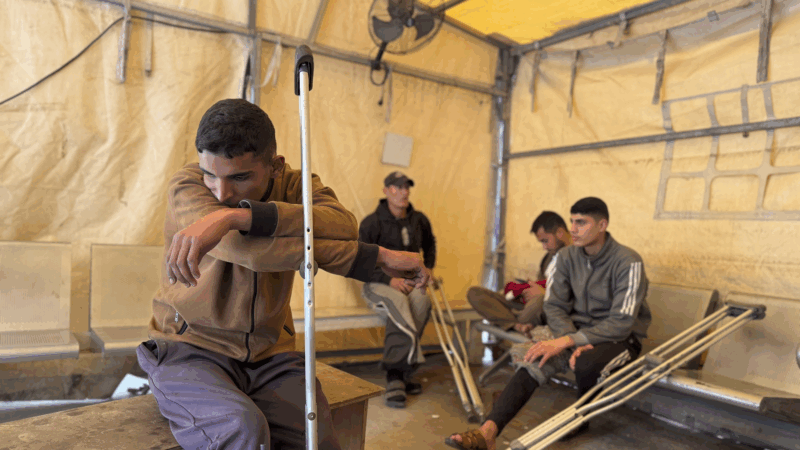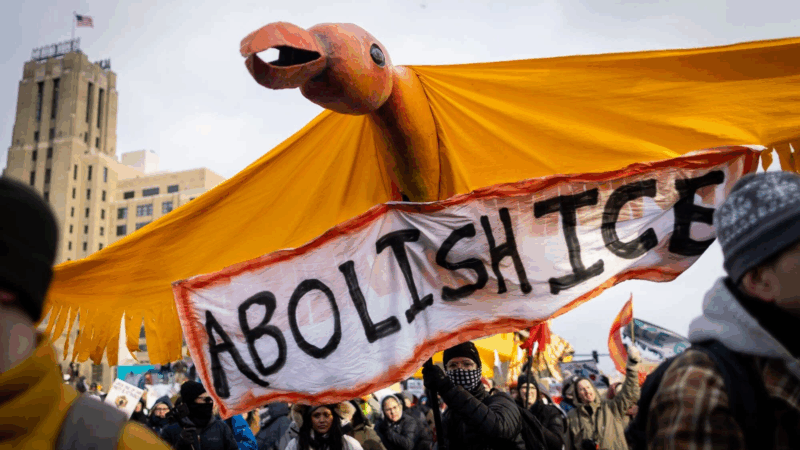Alabama’s racial, ethnic health disparities are ‘more severe’ than other states, report says
In this file photo, Jerry Burnet, of Huntsville, Ala., holds up a sign in support of the expansion of Medicaid in front of the State House as the first day of the Alabama Legislature begins on Tuesday, Jan. 14, 2014, in Montgomery, Ala. (AP Photo/Butch Dill)
Across the South, there are deep-seated racial and ethnic disparities in people’s health, their access to health care and the quality of care they receive, according to a new report from the Commonwealth Fund, a foundation that’s focused on improving the health care system in the United States. The report also highlights a stark racial divide in premature deaths.
The report offers a comprehensive analysis of how health care systems function for people in every state, evaluating disparities for Black, white, Hispanic, American Indian and Alaska Native (AIAN) and Asian American, Native Hawaiian and Pacific Islander (AANHPI) populations, both within and between states. As part of the Commonwealth Fund’s ongoing series examining state health system performance, the report uses 25 measures to produce a “score” that evaluates states on health care access, quality, service use, and health outcomes for these groups.
The data show that the quality of care people receive and their health outcomes worsened nationwide because of the COVID-19 pandemic. It also shows that many people are dying younger than they should — a term known as “avoidable death,” which includes deaths from preventable and treatable causes — because of health problems or because of inadequate medical care.
This is especially true in the Gulf South.
“Fundamentally, we do see those states as having lower performance around some key health care measures,” said Joseph Betancourt, the president of the Commonwealth Fund. “We do see greater disparities in the Gulf states when compared to some other states with poor performance for communities of color.”
Here is a quick overview of how Alabama, Louisiana and Mississippi performed:
Alabama
For Alabama, the data show white people experiencing the highest health system performance, scoring in the 61st percentile among all groups nationally.
Hispanic people experienced the lowest in the state, scoring in the 8th percentile.
“Compared to other states in the Southeast region,” the report states, “Alabama has more severe racial and ethnic health disparities.”
Louisiana
In Louisiana, white people experienced the highest health system performance — a metric composed of 25 different variables — scoring in the 63rd percentile among all population groups nationally.
Hispanic people experienced the lowest in the state, scoring in the 21st percentile.
The state ranked “worse than average” for all racial and ethnic groups where there was enough data.
Mississippi
The report found that Black people in Mississippi experienced the lowest health system performance in the state, scoring in the 5th percentile. This was also the worst performance for Black people in all states where calculation was possible.
White people experienced the highest health system performance score, landing in the 37th percentile among all population groups nationally. The state, however, ranks dead last in states where the calculation was possible, indicating that the health system performance for white people in the state was among the worst compared to other states.
Policy change can bridge the gap
The report makes several recommendations to address the disparities, with ensuring universal, affordable and equitable health coverage being chief among them.
This can be achieved through policies such as permanently extending the enhanced marketplace premium subsidies set to expire in 2025, expanding Medicaid programs in the 10 states that have failed to do so and reducing deductibles and out-of-pocket costs for marketplace insurance plans, the report suggests.
Other recommendations include strengthening primary care and improving the delivery of services, reducing inequitable administrative burdens affecting patients and providers and investing in social services.
For more, read the full report here.
This story was produced by the Gulf States Newsroom, a collaboration between Mississippi Public Broadcasting, WBHM in Alabama, WWNO and WRKF in Louisiana and NPR. Support for health equity coverage comes from The Commonwealth Fund.
Venezuela’s exiles in Chile caught between hope and uncertainty
Initial joy among Venezuela's diaspora in Chile has given way to caution, as questions grow over what Maduro's capture means for the country — and for those who fled it.
Inside a Gaza medical clinic at risk of shutting down after an Israeli ban
A recent Israeli decision to bar Doctors Without Borders and other aid groups means international staff and aid can no longer enter Gaza or the West Bank. Local staff must rely on dwindling supplies and no international expertise.
Iran warns US troops and Israel will be targets if America strikes over protests as death toll rises
Iran's parliament speaker warned the U.S. military and Israel would be "legitimate targets" if America strikes the Islamic Republic, as threatened by President Donald Trump.
Bob Weir, guitarist and founding member of the Grateful Dead, has died at 78
For three decades with the Grateful Dead and three more after the group ended following the 1995 death of his bandmate Jerry Garcia, Weir helped build and sustain the band's legacy across generations.
Nationwide anti-ICE protests call for accountability after Renee Good’s death
Activist organizations are planning at least 1,000 protests and vigils this weekend. Officials in major cities cast Saturday's demonstrations as largely peaceful.
Veteran actor T.K. Carter, known for ‘The Thing’ and ‘Punky Brewster,’ dies at 69
T.K. Carter gained fame as Nauls the cook in John Carpenter's 1982 horror classic, "The Thing."








